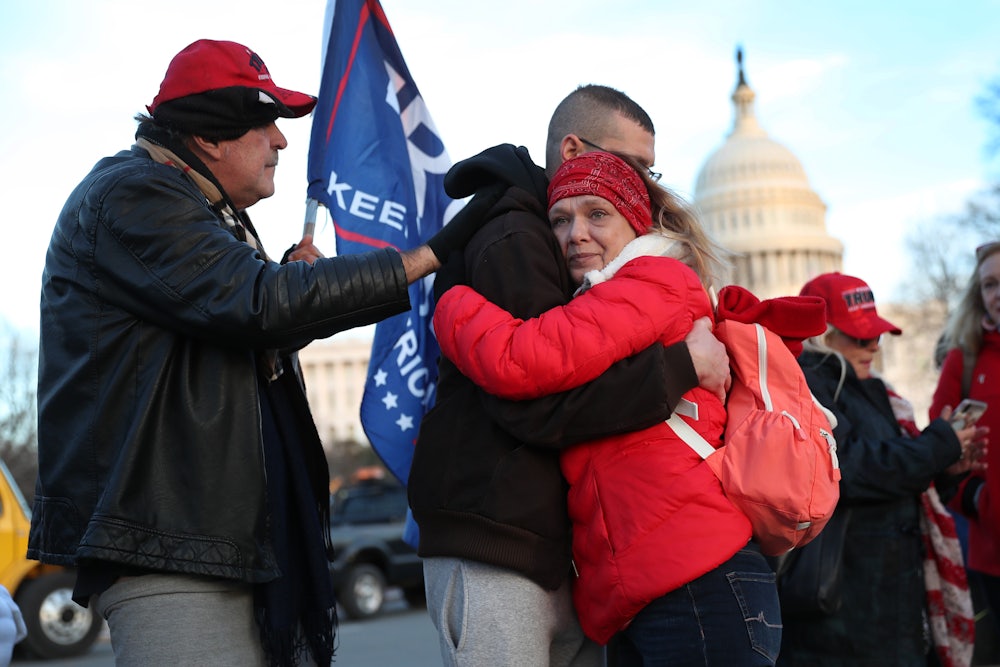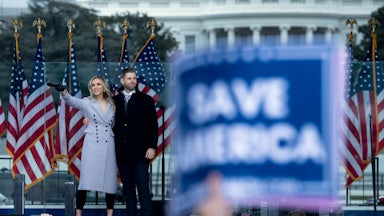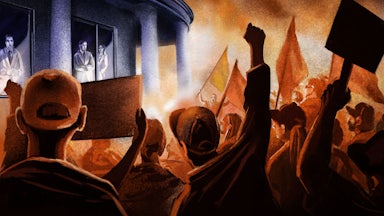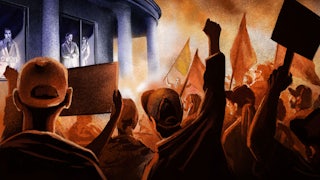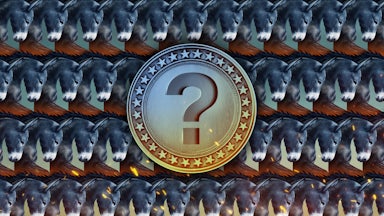Ashli Babbitt should be alive right now. A Capitol Police officer shot and killed the 35-year-old woman on January 6 outside the House chamber as she and other pro-Trump rioters besieged it. Babbitt was one of five people who died during or shortly after the insurrection, along with three other Trump supporters and Officer Brian Sicknick. Two other officers died by suicide in the weeks that followed.
Among those seven deaths, former President Donald Trump and other MAGA adherents have taken a particular interest in Babbitt. He sent out a tweet-like statement last week that simply read, “Who shot Ashli Babbitt?” Then he suggested at a rally on Wednesday that the unidentified officer’s actions weren’t justified. “The person that shot Ashli Babbitt—boom, right through the head,” he told the crowd. “Just, boom. There was no reason for that. And why isn’t that person being opened up, and why isn’t that being studied? They’ve already written it off. They said that case is closed. If that were the opposite, that case would be going on for years and years, and it would not be pretty.” His allies have followed suit: Earlier this week, Arizona Congressman Paul Gosar published a press release titled, “Who killed Ashli Babbitt?”
The rush to turn Babbitt into a martyr is part of a broader effort among conservatives and Trump loyalists to rewrite the history of January 6—to recast it as a peaceful protest with a few bad apples, rather than a mob of thousands who overwhelmed law enforcement and rampaged through the halls of Congress. But “Who killed Ashli Babbitt?” is actually a pretty easy question to answer: She was killed by the people who keep asking the question.
Before she joined an effort to overturn American democracy through violence, Babbitt led a fairly normal life. A New York Times profile earlier this year reported that she had served in the Air Force for 14 years, which included tours of duty in Afghanistan and Iraq. After returning to civilian life, she worked as a security official at a nuclear power plant in Maryland and then joined a pool-supply company with her family in San Diego.
At the same time, Babbitt found herself drawn to the pro-Trump zealotry and toxic conspiricism that dominates right-wing internet discourse. The Times reported that her Twitter feed railed against California’s leaders on issues ranging from immigration to pandemic restrictions. She shared tweets and messages indicating that she supported the QAnon moment, whose adherents fantasize about a military-led coup that results in the mass execution of Democratic politicians and prominent liberals. “Nothing will stop us … they can try and try and try but the storm is here and it is descending upon DC in less than 24 hours … dark to light!” she posted on Twitter one day before her death, referencing QAnon slogans.
The Washington Post’s Aaron Blake noted that many conservative media figures, ranging from Lou Dobbs to Dan Bongino, viewed Babbitt’s death as tragic but not necessarily scandalous. He found that things only began to change after a Times columnist noted that Babbitt was a regular viewer of Tucker Carlson’s show, which often indulges in falsehoods and conspiracy theories. Carlson defensively complained about the column on one of his February broadcasts. “But what kind of country is it where nobody says, ‘Well, wait, that’s kind of sad’?” he told viewers. “They shot an unarmed woman. Is that really a death-penalty offense?”
Some far-right figures and white nationalists began comparing Babbitt to George Floyd and other high-profile victims of police killings, perhaps to try to replicate the activism and political energy unleashed by those deaths, or perhaps merely to mock those tragedies. Others have tried to own the libs by wondering why Democrats aren’t raising more questions about this particular police shooting. “If the Democrats and Crooked Media are ignoring the ONLY shooting in the Capitol on Jan. 6th, there must be something wrong with it,” Rudy Giuliani wrote on Twitter on Wednesday.
In recent weeks, Carlson’s commentary on Babbitt has become increasingly surreal. The Fox News host played clips from an NBC interview with Russian President Vladimir Putin where the NBC reporter asks if he ordered the assassination of Alexei Navalny, a prominent opposition figure. Putin responds by asking who ordered the “assassination” of “the woman who walked into the Congress and who was shot and killed by a policeman?” Most people would probably see this flimsy deflection for what it was, but in Carlson’s ever-bewildered eyes, Putin’s remark was somehow a reasonable response and a fair question. “Who did shoot Ashli Babbitt, and why don’t we know?” he asked. “Are anonymous federal agents now allowed to kill unarmed women who protest the regime? That’s OK now? No, it’s not OK. It’ll never be OK.” He also recently interviewed Aaron Babbitt, Ashli’s widower, who is suing the Capitol Police to reveal the officer’s identity. “I never expected to lose my wife to political violence,” Babbitt told Carlson.
The attempt to make Babbitt a martyr only really gathered steam once Democrats moved to establish a body to investigate January 6. Republicans took two complementary approaches to the potential political damage that further scrutiny of the day could bring. Some argued that it was time for the country to move on, claiming Democrats were politicizing a tragedy and turning it into a partisan cudgel. Others tried rewriting events in their favor: disputing that it amounted to an “insurrection,” comparing their attack to a tourist visit, and generally painting the participants in more sympathetic terms.
Taken together, Republicans are externally downplaying January 6 while internally rewriting the history of that dark day. They want Democrats and the left to stop talking about it; they want Trump supporters to talk about it more. Some conservative figures have tried to muddy the waters even further, falsely claiming that antifa was responsible for the violence or, more bizarrely, that the FBI somehow organized the riot. Obfuscating the causes and actors behind episodes of political violence is an all-too-familiar strategy for those who sympathize with its goals.
The problem for conservatives, however, is twofold. First, Babbitt’s death is fairly well documented. At least one riot participant captured footage of the shooting while standing mere feet away from Babbitt. Snippets of the final moments of the encounter can be seen on a bodycam worn by other officers who had just arrived behind the rioters. They show an angry mob trying to break through doors and barricades set up outside the Speaker’s Lobby, which allows access into the House chamber itself and where some members of Congress had taken refuge. Officers, their guns raised, shouted multiple warnings to stop, but Babbitt tried to climb through a window toward them.
A masked officer then fired a single shot, and Babbitt fell to the ground. In April, the U.S. attorney’s office for the District of Columbia announced that it wouldn’t press charges against the officer for his actions. “Specifically, the investigation revealed no evidence to establish that, at the time the officer fired a single shot at Ms. Babbitt, the officer did not reasonably believe that it was necessary to do so in self-defense or in defense of the Members of Congress and others evacuating the House Chamber,” the office said in a statement. In other words, it would have been almost impossible to convince a jury that the officer was wrong to think that a violent mob storming the Capitol posed an immediate threat to him or to the lawmakers he was protecting.
The second problem for those asking “Who killed Ashli Babbitt?” is more fundamental: Human beings do not have the memory of a goldfish. People remember that Trump and his allies spent months lying about the election results, falsely claiming that it was stolen from him, and telling his supporters to take action. People also remember that Trump summoned his supporters to the National Mall on January 6, told them the country was in peril, and urged them to march up Capitol Hill to express their anger. If Trump had just conceded the election before January 6, would Babbitt have boarded a plane to Washington to support him? If right-wing media figures hadn’t echoed Trump’s lies, would she have been anywhere near the Capitol on that fateful day?
If Trump and his allies really want to know who is responsible for Babbitt’s death and the deaths of others on January 6, they need only look in a mirror. Hunting for a scapegoat on the Capitol Police force is a misguided way to smother any embers of guilt that burn in their hearts. Their reckless revisionism could also have more tragic consequences down the road. The greatest danger with turning Babbitt into a martyr is that it risks creating more of her: people who are willing to fight and even die for hollow, corrupt lies.
